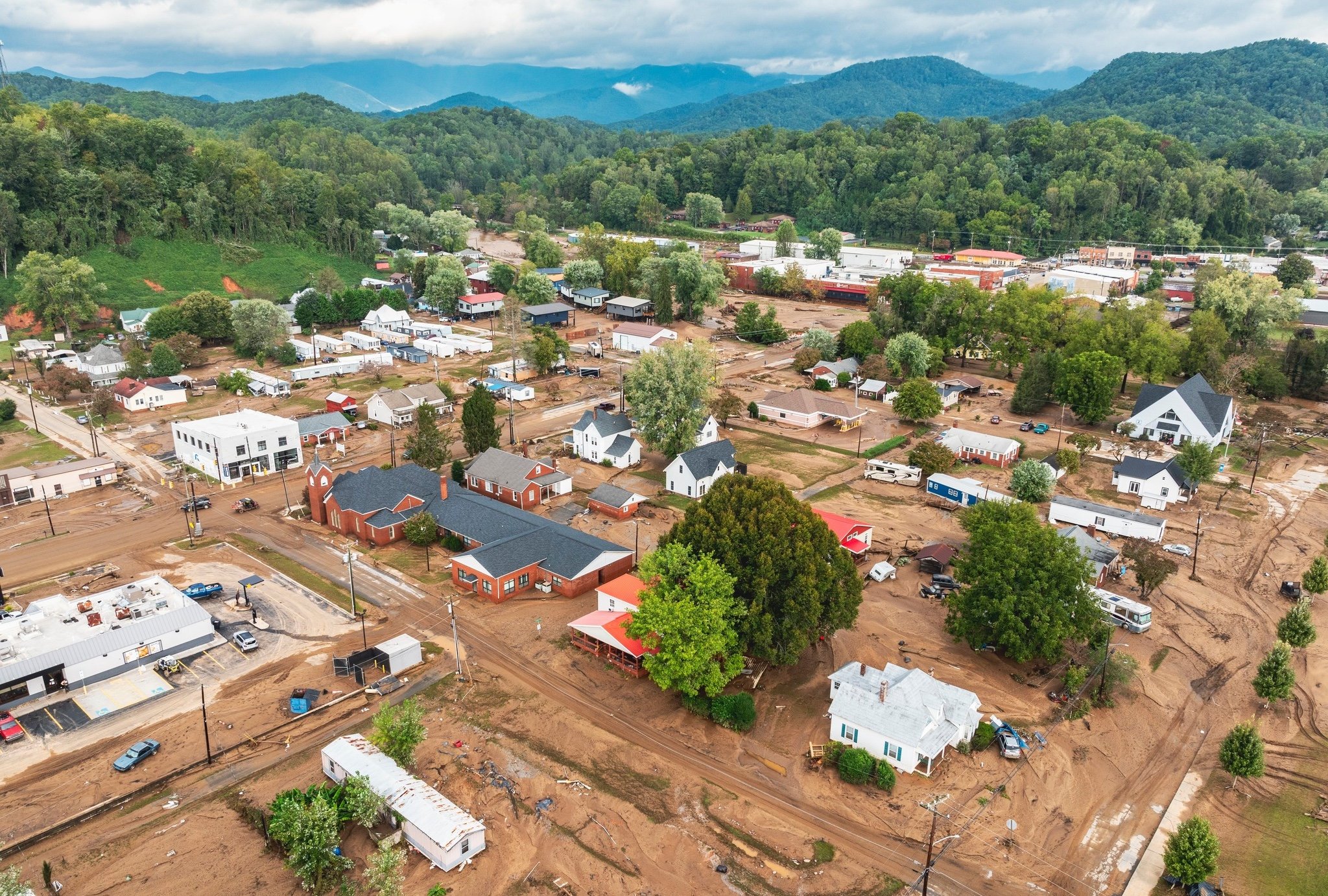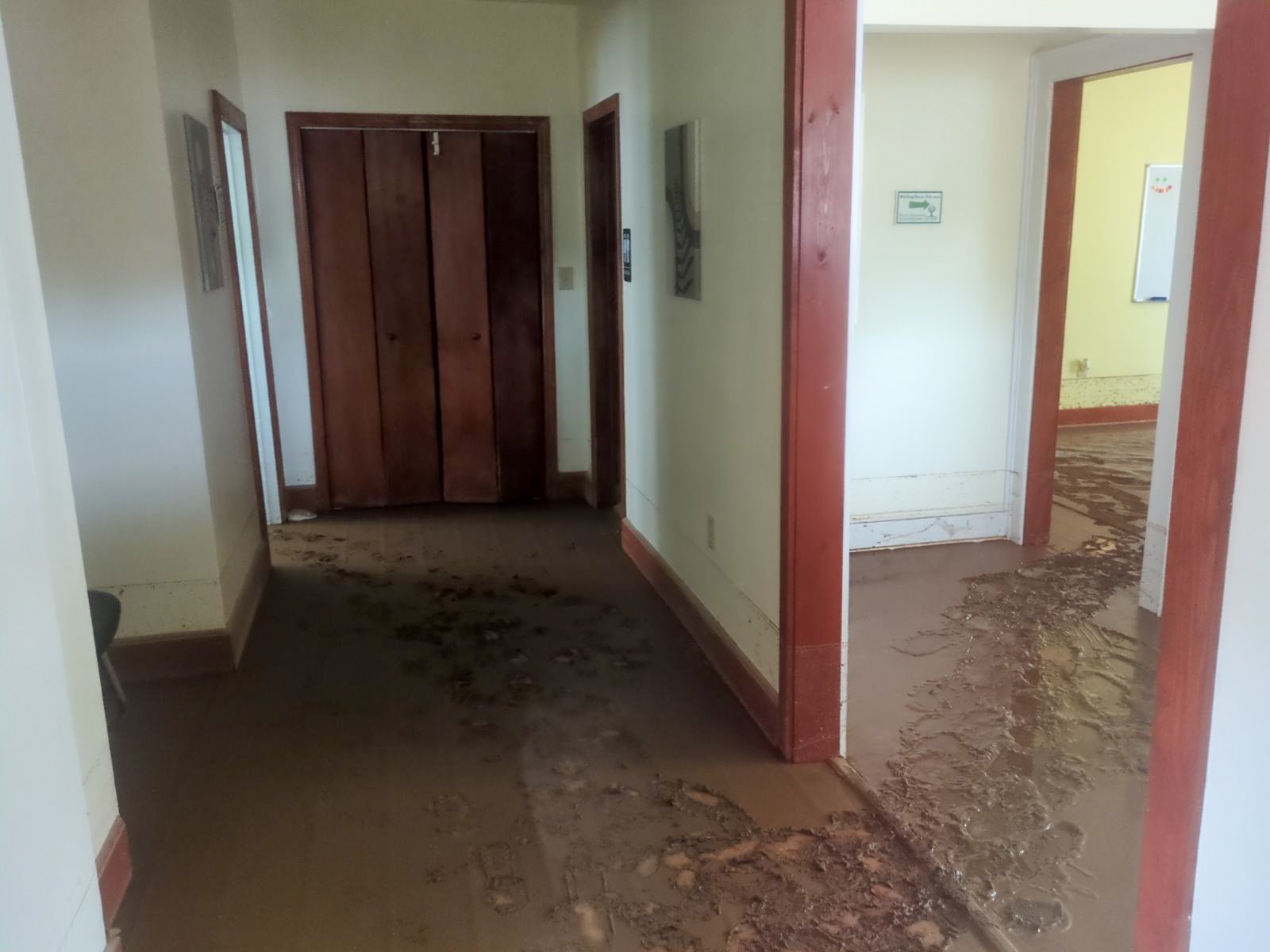BMCC’s Hurricane Helene Story












In the wake of Hurricane Helene, our region faced unprecedented devastation, and Black Mountain Counseling Center has been deeply affected. BMCC’s newly opened and quickly beloved office in Old Fort was tragically lost to the storm, with floodwaters ripping away the wheelchair ramp, ruining furniture on the first floor, and depositing a car in the front yard and inches of thick mud that have compromised the foundation of the building. To read more about our Old Fort Office space visit our blog. Our Black Mountain office suffered significant damage as well; flooding the basement, impacting critical parts of the building, and ultimately reducing our private counseling spaces from seven to two overnight. Despite these challenges, our commitment to providing mental health support remains unwavering. Within days of the storm, BMCC counselors affirmed their commitment to caring for their neighbors, launched a helpline for immediate support, and staffed in-person clinics. Staff has since found a new normal and is working diligently to see as many clients as possible.
As the storm's immediate aftermath fades, we know the emotional and psychological scars will linger for months and years. Mental health care is more essential than ever, as many in our community grapple with trauma, loss, and uncertain futures. The demand for BMCC’s counseling services will grow exponentially, but our infrastructure losses have severely hindered our capacity. We need your support! Every investment in our facilities and services directly impacts the healing and resilience of our neighbors in Black Mountain, Swannanoa, Old Fort, and beyond. We are working hard to get our Black Mountain office back to full capacity as well as exploring our options in Old Fort and finding new roads to reopening. Your support and donations will directly impact our ability to operate at full, and even expanded, capacity as soon as possible.
Mental Health Resources
Local mental health support is available from Black Mountain Counseling Center! Text or call +1 (828) 388-7433 and leave a message and a licensed, local mental health professional will get back to you as soon as possible. Please include your preferred method of communication, as we know many continue to struggle with various forms of communication. If email is easier for you, you can email us at helenesupport@blackmountaincounseling.org.
Our counselors are available for free, pro-bono calls and virtual appointments depending on their personal situations, which are constantly evolving. Our counselors deeply love the communities we serve and are ready to help their neighbors today and as long as needed. If you are ready to talk, we will be there to listen.
Need help coping with traumatic stress right now? Check out this guide on emotional recovery after a natural disaster.
Looking for other resources, pro-bono counselors, and more? Visit our Linktree which has a compilation of up-to-date resources - linktr.ee/blackmountaincounselingcenter.
Need to talk to someone right now? Text or Call:
Suicide and Crisis Lifeline: 988
SAMHSA Disaster Helpline: 1-800-985-5990
Crisis Text Line 741741 - text only
Hurricane Helene and PTSD
Hurricane Helene was a devastating Category 4 storm that made landfall on September 26, 2024. It brought powerful winds of 140 mph, severe flooding. The storm caused extensive damage across the southeastern U.S., especially in the Appalachian region. Western North Carolina was among the hardest-hit regions during Hurricane Helene, primarily due to intense flooding, landslides triggered by the storm's torrential rainfall, and landscape-scale tree loss from blow-downs. The combination of flooding, landslides, power outages, loss of cellular services, and loss of potable water made recovery in Western North Carolina particularly challenging. In the aftermath of Hurricane Helene, mental health resources will play a critical role in helping individuals and communities in Western North Carolina areas recover. The storm's widespread destruction, including severe flooding, landslides, and prolonged power outages, has left many residents grappling with the trauma of losing homes, loved ones, and their sense of security. Natural disasters like Helene often lead to heightened anxiety, depression, and post-traumatic stress disorder (PTSD) among survivors. Many people have experienced the devastating loss of homes, possessions, and in some cases, the displacement of entire communities. Processing such life-altering losses often requires professional psychological support, especially for vulnerable populations such as children, the elderly, and those with pre-existing mental health conditions. Emergency personnel and volunteers who helped with rescues and recovery efforts may experience emotional and psychological strain. They often work under extreme stress and witness distressing scenes, leading to compassion fatigue or secondary trauma. Recovery from such a disaster is not just about rebuilding infrastructure but also about addressing the long-term psychological impacts. People affected may need ongoing counseling and support as they navigate the stressors of rebuilding their lives, dealing with insurance claims, and coping with financial uncertainty. To address these challenges, mental health services will be essential.
Please find a blog post containing a reflection on grief by BMCC Counselor Melissa Raines linked below.
Messages from BMCC’s Board Chair and Executive Director
Friends -
First and foremost, I want to express my deepest gratitude for crews from all over the country coming to WNC to offer aid for all of us in the middle of the Hurricane Helene disaster. Though supplies are plentiful, and the help has been truly amazing, we are not nearly at the end. Restoration and rebuilding will take months that could lead into years. The chart, included in this newsletter, developed by Episcopal Relief and Development on the Emotional Lifecycle of a Disaster allows you to see visually what our region is facing. Most of us are still in the Honeymoon phase, with lots of help still in the region. But as the cameras and the volunteers and the supplies dwindle, we will move into the disillusionment stage and mental health services will drastically increase. We at the Black Mountain Counseling Center are preparing for a huge influx of clients. We are preparing to offer grief groups and individual counseling. But we need your help to make that happen. Financial resources are critical to support and pay our therapists. We have had damage to our buildings, but our clients and our therapists come first. Any amount will help us offer needed mental health resources to the residents of Buncombe and McDowell Counties.
Thank you,
Kristi Neal, BMCC Board Chair
It’s a marathon, not a sprint.
Those are the words I am telling our staff. As people start to come out of disaster mode and begin to reflect, the post-traumatic stress and grief increase. As Black Mountain Counseling Center is the mental health hub in Black Mountain and Old Fort, we feel that it is our calling to be there for the long haul. To meet these needs the counseling center will be looking to hire more therapists and increase programming in areas such as grief groups and individual counseling. Since our Old Fort office was destroyed, we are now looking for a safe and calming space for those who are hurting in that area. We are blessed to be in a community that is so deeply invested in caring for each other and we are hoping that we can do the same in this rebuilding process.
Thank you,
Ellen Begley, BMCC Executive Director



